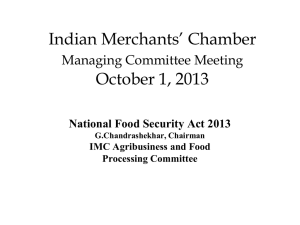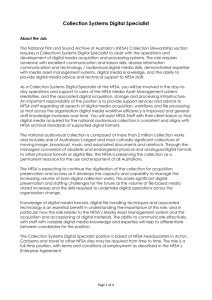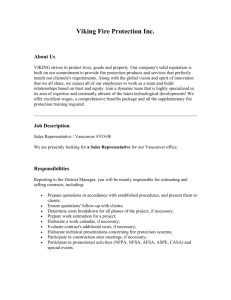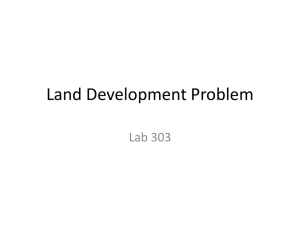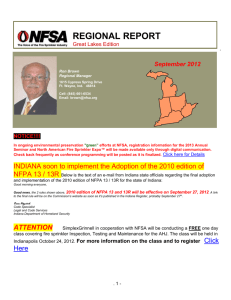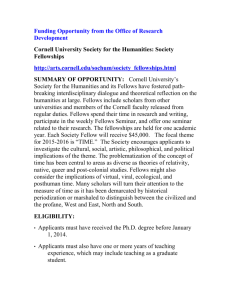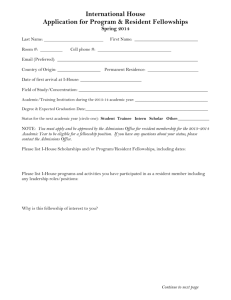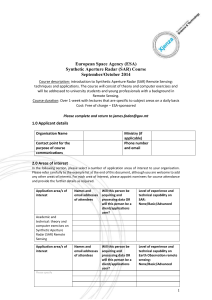NFSA RESEARCH FELLOWSHIP GUIDELINES / JUNE 2008
advertisement
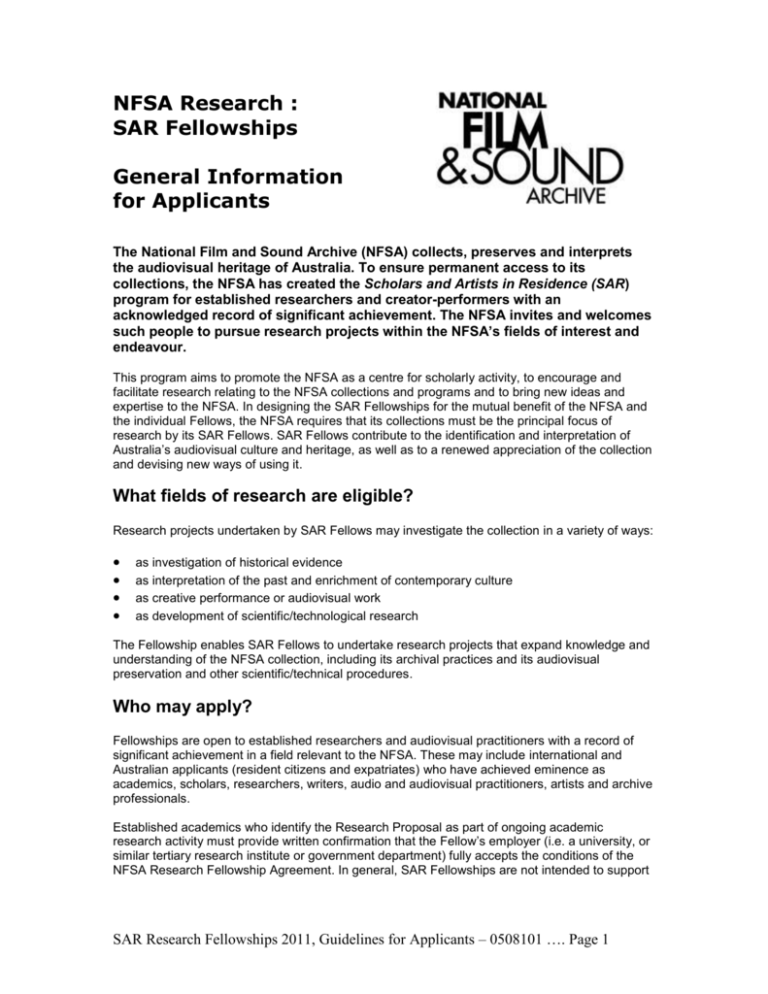
NFSA Research : SAR Fellowships General Information for Applicants The National Film and Sound Archive (NFSA) collects, preserves and interprets the audiovisual heritage of Australia. To ensure permanent access to its collections, the NFSA has created the Scholars and Artists in Residence (SAR) program for established researchers and creator-performers with an acknowledged record of significant achievement. The NFSA invites and welcomes such people to pursue research projects within the NFSA’s fields of interest and endeavour. This program aims to promote the NFSA as a centre for scholarly activity, to encourage and facilitate research relating to the NFSA collections and programs and to bring new ideas and expertise to the NFSA. In designing the SAR Fellowships for the mutual benefit of the NFSA and the individual Fellows, the NFSA requires that its collections must be the principal focus of research by its SAR Fellows. SAR Fellows contribute to the identification and interpretation of Australia’s audiovisual culture and heritage, as well as to a renewed appreciation of the collection and devising new ways of using it. What fields of research are eligible? Research projects undertaken by SAR Fellows may investigate the collection in a variety of ways: as investigation of historical evidence as interpretation of the past and enrichment of contemporary culture as creative performance or audiovisual work as development of scientific/technological research The Fellowship enables SAR Fellows to undertake research projects that expand knowledge and understanding of the NFSA collection, including its archival practices and its audiovisual preservation and other scientific/technical procedures. Who may apply? Fellowships are open to established researchers and audiovisual practitioners with a record of significant achievement in a field relevant to the NFSA. These may include international and Australian applicants (resident citizens and expatriates) who have achieved eminence as academics, scholars, researchers, writers, audio and audiovisual practitioners, artists and archive professionals. Established academics who identify the Research Proposal as part of ongoing academic research activity must provide written confirmation that the Fellow’s employer (i.e. a university, or similar tertiary research institute or government department) fully accepts the conditions of the NFSA Research Fellowship Agreement. In general, SAR Fellowships are not intended to support SAR Research Fellowships 2011, Guidelines for Applicants – 0508101 …. Page 1 research projects which are a component of postgraduate studies or which lead to the creation of independent works not directly related to the NFSA. What support is available? Several Fellowships will be awarded each year, depending on available resources and the scope of the research proposals. In the main, they will be based at NFSA headquarters in Canberra. Depending on the requirements of the applicant, Fellowships may be awarded on a full- or parttime basis, for a maximum period of eight weeks. The start date, duration and the actual period of the Fellowship will be negotiated prior to commencement. The Fellowship will include the following in-kind-support: direct access to the NFSA library and collections, databases and our specialist staff and expertise (fees waived) access to auditioning and reading/viewing facilities within the NFSA (fees waived) office space and a computer with network and internet connections, as well as telephone and photocopying facilities self-maintained (rent-free) residential accommodation (not available until 1 February 2011) and on-site car parking (if required by non-Canberra based Fellows) free admission to NFSA activities, including film screenings and other events, as well as staff research presentations introductions to other national institutions, archives and experts relevant to the research project. SAR Fellows will not receive direct financial remuneration such as a living allowance or stipend. However, some costs related directly to the research project will be reimbursed by the NFSA on provision of receipts. SAR Fellows are required to meet their own living and personal travel expenses and to make their own travel arrangements. What are the requirements of and outcomes from the SAR Fellowship? Preliminary outcomes will be discussed during an introductory interview and can be modified, with mutual agreement, during the course of the residency. In general, Fellows will be required to: undertake a significant piece of research for publication, presentation, performance or exhibition spend most of the time associated with their research at the NFSA Canberra headquarters, unless the specific project requires the researcher to work elsewhere present at least one public lecture and/or seminar to Archive staff and invited guests enhance NFSA collection records, where relevant notify the NFSA of publications, presentations and other activities that relate to their NFSA research period make themselves available to publicize their research, and promote the benefits of having access to the NFSA collections and the Fellowship program acknowledge the support of the NFSA in any publication, performance or presentation resulting from the research upon acceptance of the Fellowship, sign a contract which includes negotiated outcomes make their own arrangements for personal insurances notify SAR management of any potential risks, health issues and so on At the conclusion of the Fellowship, SAR Fellows will be required to: SAR Research Fellowships 2011, Guidelines for Applicants – 0508102 …. Page 2 prepare a report of their research outcomes provide the NFSA with a copy of any research outcome complete an evaluation of their time at the NFSA Where appropriate, the NFSA may assist with the negotiation of intellectual property rights on a case-by-case basis. The NFSA may also seek first option rights to publish the research outcomes online, in print or in some other form. If the NFSA has not exercised this right within two years of the completion of the Fellowship, the Fellow is free to offer his research to another potential publisher. When can I apply? Fellowship applications are welcome at any time before the designated closing date each year. (Applications for SAR Fellowships in 2011 will close on Thursday 30 September 2010. Notifications will commence as soon as possible after Monday 1 November 2010). What are the selection criteria? Whilst acknowledging that each type of research may entail different approaches, the NFSA will assess each Fellowship application according to the following criteria: originality and innovation relevance and significance, including the possible alignment of the research proposals to the NFSA own research themes and programs the capacity for the transfer of knowledge to the best advantage of the NFSA, internally and externally, in terms of outreach, education and training ability to withstand interrogation potential contribution to knowledge The NFSA will also assess each proposal according to the likely level of resourcing required for each proposal, in both financial and human support terms an evaluation of the risks, both strategic and operational, inherent in each proposal the need for the project to be monitored and the governance issues that may need to be applied the capacity for the success of the project when measured against NFSA Key Performance Indicators In some instances, the NFSA may consult external referees or peers to assist in assessing applications. The NFSA recognizes the importance of peer evaluation at levels that are appropriate to the NFSA’s own research programs. In assessing applications for Fellowships, the NFSA will take into account the following: SAR Research Fellowships 2011, Guidelines for Applicants – 0508103 …. Page 3 qualifications of the applicant research experience and demonstrated quality of that research record of completing research/creative projects within a given time frame and publishing/producing the results of that research/project, as confirmed by referees. To assess the quality of each research project, the NFSA will evaluate how the proposal has been created by preliminary investigation of the NFSA collection the project activity intends to make use of the NSFA collection the research question or artistic concept has been defined and mapped out with clear research methods the results of the research will be made available (in publications, productions, performances, exhibitions, technical/scientific advances, or by other means) and how those results will promote awareness of the NFSA, its practices and collections each project will contribute to enhanced knowledge in its field. Please complete and return the application form (available from www.nfsa.gov.au), along with: a detailed research proposal a current curriculum vitae, including a list of major publications and/or productions if relevant, a DVD show-reel and samples of audiovisual projects as MP3 files. Please ALSO send electronic copies of the application form, research proposal and curriculum vitae to: sar@nfsa.gov.au For further information about SAR Fellowships please contact: Dr Jennifer Gall Manager, Scholars and Artists in Residence Program, National Film and Sound Archive, GPO Box 2002 Canberra ACT 2601 Australia Phone: (Australia) (02) 6248 2129 Fax: (Australia) (02) 6248 2167 Email: sar@nfsa.gov.au (international) + 61 2 6248 2129 (international) + 61 2 6248 2167 IMPORTANT NOTE: The information contained in this document is provided for general information purposes only and does not have any legal effect. Specific terms of engagement will be negotiated with successful applicants. SAR Research Fellowships 2011, Guidelines for Applicants – 0508104 …. Page 4
